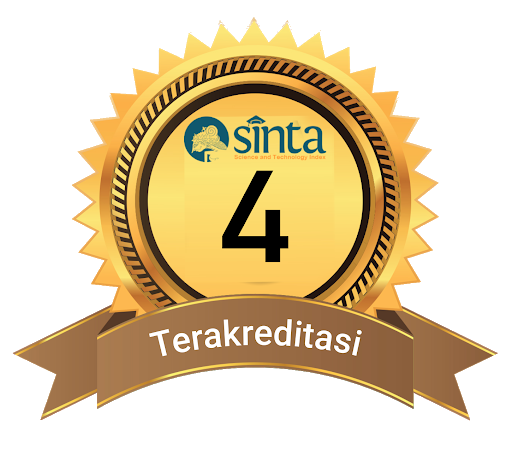ANALISIS TERHADAP HADIS KISAH ORANG YANG BERPENYAKIT LEPRA, BERKEPALA BOTAK DAN ORANG BUTA YANG DIUJI OLEH ALLAH SEBAGAI BENTUK EVALUASI AFEKTIF DALAM PENDIDIKAN ISLAM
Abstract
In Islamic education, evaluation is one component of the Islamic education system that must be done systematically and planned as a tool to measure success or targets to be achieved in the process of Islamic education and learning process that is expected to be achieved by learners. Evaluation in Islamic education certainly refers to the source of Islamic teachings themselves, namely Qur'an and Hadith. Related to the source of Islamic teachings both forms of evaluation are contained in many hadiths conveyed by the Prophet, whether in the form of stories or stories or in the form of the words of the Prophet when evaluating the Companions to the tasks that have been mandated to them or evaluating the memorization or knowledge of friends who have taught the Prophet, and various other forms of evaluation contained in the hadiths of the Prophet contained in various books of hadith. To obtain information on this tradition is done tracking by using takhrîj method of hadith, so will be met the hadiths of the Prophet who contains stories that contain elements of evaluation in various books of Hadith. These hadiths analyzed the quality of their history and linked it with evaluation in Islamic education.
Full Text:
Download PDF (Bahasa Indonesia) Download PDF (Bahasa Indonesia) Download PDF (Bahasa Indonesia)References
Abdul Majdi. 2011. Perencanaan Pembelajaran. Bandung: PT. Remaja Rosdakarya
Abu ‘Abdillah Muhammad Ibn Ismail Ibn Ibrahim Ibn al-Mughirah Ibn Barbazah al-Bukhariy. 1987. Shahîh Bukhâriy. Cairo: Dâr asy-Syu’ab
Abu Al-Husayn Muslim Ibn Al-Hajjaj Ibn Muslim Al-Quisyayriy An-Nisbabury. T.th. Shahîh Muslim. Beirut: Dâr al-Fikr
Abdurrahman Shaleh. 1994. Teori-Teori Pendidikan berdasarkan al-Qur’an.Jakarta: PT. Rineka Cipta
Abuddin Nata. 2005. Filsafat Pendidikan Islam, Jakarta: Gaya Media Pratama
------------------, 2010, Ilmu Pendidikan Islam, Jakarta: Kencana prenada Media Group
Azra Azyumardi. 1999. Pendidikan Islam, Tradisi dan Modernisasi Menuju Milenium Baru. Jakarta: PT. Logis
Daryanto. 2004. Evaluasi Pendidikan. Jakarta: Rineka Cipta
Desmita. 2009. Psikologi Perkembangan Peserta Didik, Panduan bagi Orang Tua dan Guru dalam Memahami Psikologi Anak Usia SD, SMP, dan SMA. Bandung: PT. Remaja Rosdakarya
Diane E. Papalia dkk. 2009. Human Development, Perkembangan Manusia. Jakarta: Salemba Humanika. Buku 10 Edisi 2
Edi Safri. Al-Imam al Syafi’iy Metode Penyelesaian Hadis-Hadis Mukhtalif. Padang: IAIN IB Press
G.F. Flanagan. 1981. Perkembangan Anak Sejak Dalam Kandungan hingga Usia 6 Tahun, Editor Dra. Desmita, Judul Asli “The First Nine Months of Live, New York:1962. Jakarta: Yayasan Cipta Loka Caraka
Hasmiati, 2016, Kedudukan Evaluasi Dalam Pendidkan Islam, Jurnal al-Qalam volume 8 nomor 1
John M. Echols dan Hassan Shadiliy, Kamus Inggris Indonesia
Maizuddin. 2008. Metodologi Pemahaman Hadis. Padang: Hayfa Press
Mimin Haryati. 2009. Model dan Tek nik Penilaian pada Tingkat Satuan Pendidikan. Jakarta: Gaung persada Press
Muhammad bin ‘Isa Abu ‘Isa at-Tirmidziy. t.th. Jâmi’ at-Tirmidziy. Beirut: Dâr Ihyâ’ at-Turâts al-‘Arabiy
Muhammad Agus. Solahudin. 2009. Ulumul Hadis. Bandung : Pustaka Setia
Muhammad ‘Ajjaj Al-Khatib. 1989. Ushûl al-Hadîts ‘Ulûmuhu wa Musthalahuhu. Beirut: Dâ’r al-Fikr
Muhammad Muchlis Solichin. 2012. Psikologi Belajar: Aplikasi Teori-Teori BelajarDalam Proses Pembelajaran. Yogyakarta: Suka Press
Muhammad Syuhudi Ismail. 1995. Kaidah Keshahihan Sanad Hadis, Tela’ah Kritis dan Tinjauan dengan Pendekatan Ilmu Sejarah. Jakarta: Bulan Bintang
Muhammad Quraish Shihab. 2012. Tafsir al-Mishbah. Jakarta: Lentera Hati
Nana Sudjana. 2006. Penilaian Hasil Proses Belajar Mengajar. Bandung: Remaja Rosdakarya
Nuruddin ‘Itr. 1994. Ulum al-Hadis, alih bahasa, Drs. Mujiyo, judul asli “Manhaj al-Naqd fi ‘Ulum al-Hadis”. Bandung: Remaja Rosdakarya
Sitti Mania. 2012. Penatar Evaluasi Pengajaran. Makassar: Alauddin University Press.
Ramayulis, 2010, Ilmu Pendidikan Islam, Jakarta: Kalam Mulia
‘Umar Sulaiman ‘Abdullah al-‘Asyqar. 1997. Shahîh al-Qashash al-Nabawiy. Beirut: Dâr al-Nafâis li al-Nasyr wa al-Tauzî
DOI: http://dx.doi.org/10.31958/jeh.v2i1.827
Refbacks
- There are currently no refbacks.
Copyright (c) 2018 Salmah Salmah

This work is licensed under a Creative Commons Attribution-NonCommercial 4.0 International License.
El-Hekam Indexed By:














